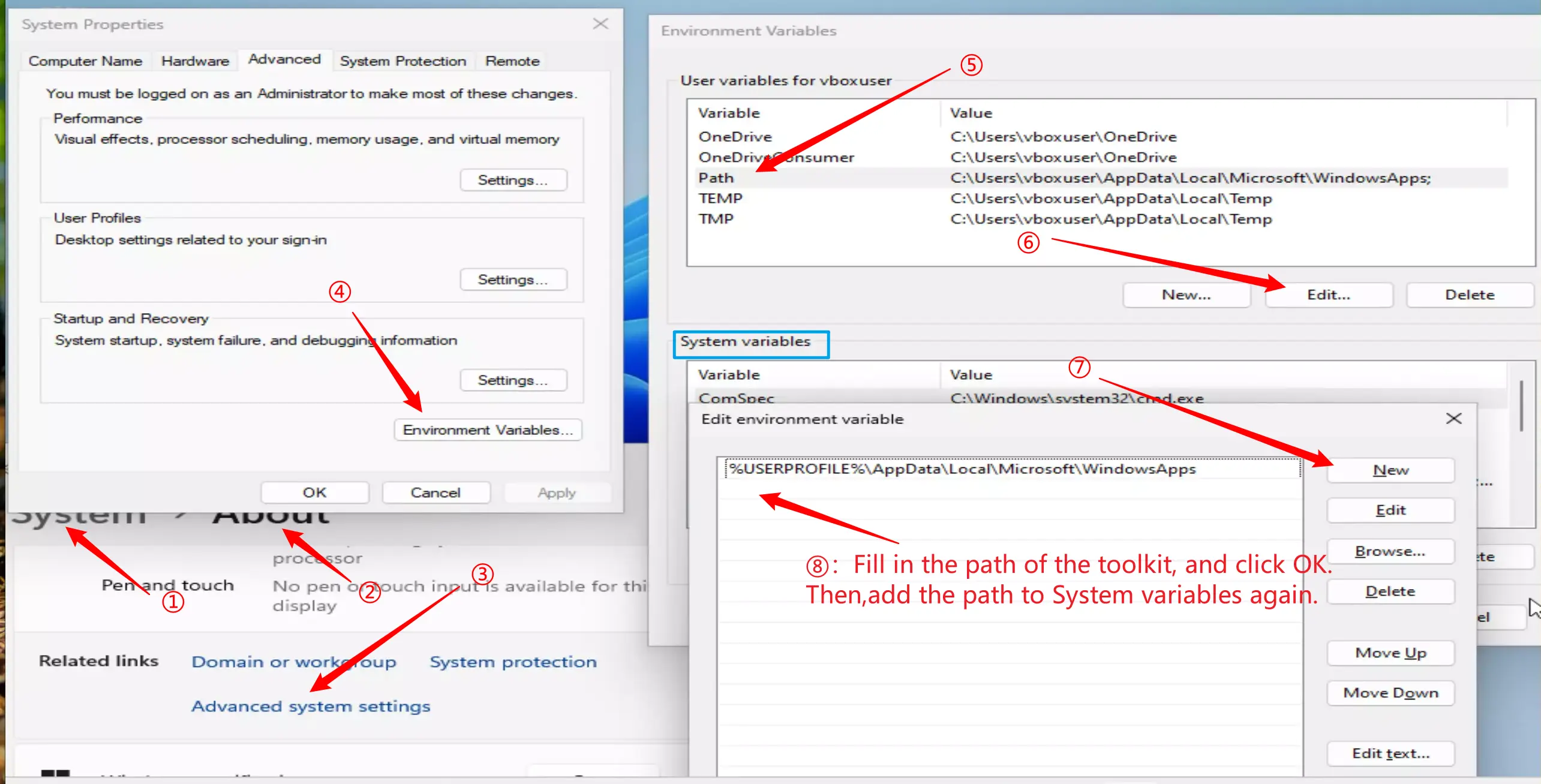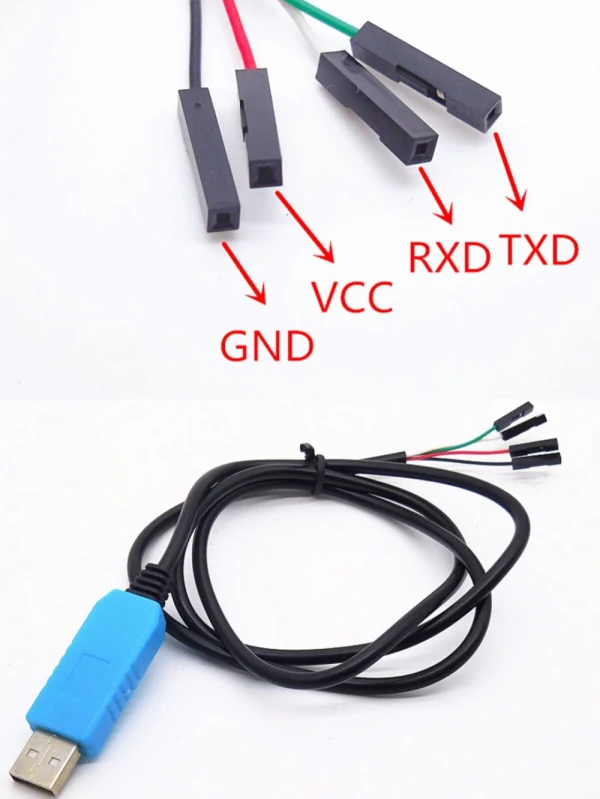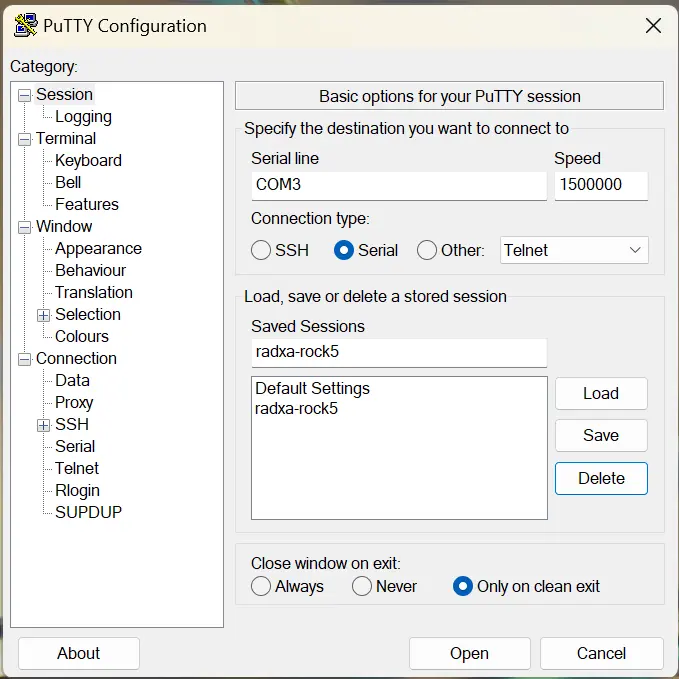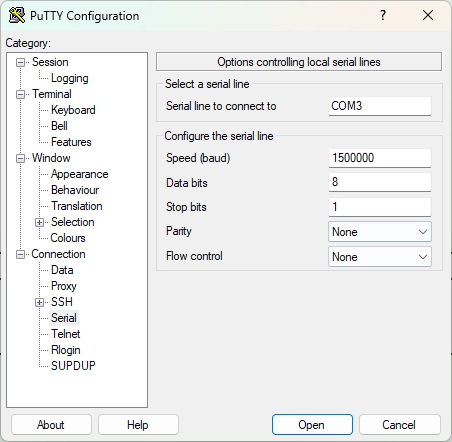Remote login
Introduce how to access SBC through a personal computer (PC) via serial port,adb,etc.
- ADB login
- Serial login
ADB is a bridge between your Android device and your computer, and is used to fully operate and manage your Android device on your computer.
preparation
install adb(Android Debug Bridge):
- Windows
- Linux
- Mac
Download the Windows version of the adb toolkit from Android,and after downloading and decompressing,you need to configure the environment variables:
Method 1:Enter the following command in the terminal window:
set HTTP_PROXY=myserver:1981
Method 2:Open system settings and modify environment variables:
Use the following command to install:
sudo apt install adb
Download the Mac version of the adb toolkit from Android,and after downloading and decompressing,you need to configure the environment variables:
export PATH=${path}:~/platform-tools( '~' is the path of the extracted toolkit)
- Wired login
- Wireless login
Requirements
- 1 x USB A-A cable
- 1 x computer or laptop with the ADB tool installed on it
- 1 x ROCK 2A
Steps
- Connect the USB cable between the USB connector of the computer and the OTG Type C connector of the ROCK 2A.
- Open the computer terminal and enter adb devices to confirm that the ROCK 2A is recognized.Type adb shell to login.
$ adb devices
List of devices attached
f94f8e0d28380ceb device
$ adb shell
RadxaRock2A:/ $
Wireless ADB is supported on Android 11 and later.
Requirements
- a computer or laptop with ADB tools installed and ADB version greater than 31.0.0.
- a ROCK 2A with an Android image greater than or equal to 11.
- the computer and ROCK 2A need to be on the same LAN.
Steps
- Start ROCK 2A and connect to the network using wifi.
- Enter the Developing mode by tapping the version number 7 times (Settings -> About Tablet -> Version Number).
- Go to Developing Options (Settings -> System -> Developing Options),turn on wireless debugging and memorize the IP address and interface (example: 10.0.0.16:45613).
- Open a computer terminal and type adb connect 10.0.0.16:45613 to connect to the ROCK 2A,type adb shell to login.
$ adb connect 10.0.0.16:45613
$ adb shell
RadxaRock2A:/ $
Most of radxa's products define pins 8 (TX) and 10 (RX) on the GPIO pins as UART serial communication interfaces to make it easier to troubleshoot problems in the early startup phase of the system.
Preparation
- Radxa product with GPIO, compatible power supply
- PC
- USB to TTL Serial Cable

For Radxa products based on Rockchip chips, the default UART configuration is 1500000n8 without flow control.
Please check if your USB to TTL serial cable supports 1.5M baud rate:
- Based on CP210X and PL2303x some products have baud rate limitations.
- Based on FT232RL, some products have power issues.
The Flowing text uses a serial cable based on CH340.
Serial Connection
As shown below, connect the USB to TTL serial cable:
| Radxa SBC | Connection | Serial Cable |
|---|---|---|
| GND (pin 6) | <---> | Black line |
| TX (pin 8) | <---> | White line |
| RX (pin 10) | <---> | Green line |

Please do not connect the red power line!
Using Serial Tools
For Radxa products based on Rockchip chips, the default UART configuration is as follows:
baudrate: 1500000
data bit: 8
stop bit: 1
parity : none
flow control: none
- Windows
- Linux
- Mac
Windows
Putty is a serial tool that supports multiple baud rates on Windows. Here's how to use Putty to connect to the serial port.
-
Download Putty and install it.
-
Plug the USB to TTL serial cable into the PC, check the Device Manager to find the COM number. Here, assume it is COM3.
-
Open Putty and set it up as follows:
- Select Session in the left column, set the serial line to COM3, baud rate to 1500000, and connection type to Serial.
- Write radxa-rock5 in the Saved Sessions column and click Save.

- Select Serial at the bottom of the left column and configure it as follows:

- After setting up, click Open to open the serial port. Make sure the TTL end is correctly connected, then turn on the power to the board.
Linux
Minicom is a serial tool that supports multiple baud rates on Linux. Here's how to use Minicom to connect to the serial port.
- Plug the USB end of the serial cable into the host PC, then find the serial device:
On the terminal, type dmesg | tail to get a printout similar to the following:
[10.654076] usb 1-6.4.3: new full-speed USB device number 103 using xhci_hcd
[10.755730] usb 1-6.4.3: New USB device found, idVendor=0403, idProduct=6001
[10.755732] usb 1-6.4.3: New USB device strings: Mfr=1, Product=2, SerialNumber=0
[10.755733] usb 1-6.4.3: Product: USB <-> Serial
[10.755734] usb 1-6.4.3: Manufacturer: FTDI
[10.756728] ftdi_sio 1-6.4.3:1.0: FTDI USB Serial Device converter detected
[10.756750] usb 1-6.4.3: Detected FT232BM
[10.757195] usb 1-6.4.3: FTDI USB Serial Device converter now attached to ttyUSB0
As shown in the last line, /dev/ttyUSB0 is the newly inserted serial device.
Maybe there is no permission to read and write the serial port.
Temporary solution: Change the permission with the chmod command
sudo chmod 777 /dev/ttyUSB0
Permanent solution: Add the current user to the dialout group
sudo usermod -aG dialout $USER
- Install minicom:
sudo apt-get update
sudo apt-get install minicom
- Set up minicom:
Please add the current non-root or non-sudo user to the plugdev group first.
sudo usermod -aG plugdev $USER
Edit ~/.bashrc and add the following parameters. After reopening a new terminal, it will take effect.
alias minicom='minicom -w -t xterm -l -R UTF-8'
Create and edit the file ~/.minirc.1500000-usb0, add the following content:
pu port /dev/ttyUSB0
pu baudrate 1500000
pu bits 8
pu parity N
pu stopbits 1
pu rtscts No
- Run the following command to connect to the device, specifying the parameter 1500000-usb0 to use the above configuration.
minicom 1500000-usb0
Mac
Picocom is a serial tool that supports multiple baud rates on Mac. Here's how to use Picocom to connect to the serial port.
- Install picocom
% brew install --build-from-source radxa/picocom/picocom
- Open picocom
% picocom -b 1500000 -d 8 /dev/tty.usbserial-2130
FAQs
- When using the debug console, the system startup information is displayed on the screen, but I cannot enter text using the keyboard?
It may be that
Hardware Flow Controlis enabled by default. After turning offHardware Flow Control, it should return to normal.